Our center
Equipment
Lee Women's Hospital IVF Professional Equipment
| Transvaginal Ultrasound | Provides follicle tracking, application for egg retrieval surgery, and scans the condition of the uterus or ovaries |
|---|---|
| High-Level Ultrasound | Offers relevant research on the impact of embryo implantation on endometrial blood flow |
| Embryo Bank | The embryo bank is a 24-hour access-controlled storage space, where embryos are stored long-term in liquid nitrogen tanks at a temperature of minus 196°C |
| Automatic Sperm Analyzer | Utilizes computer-integrated image analysis system as an instrument for fully automated semen analysis |
| Phase-Contrast Microscope | Provides observation of embryo morphology, determination of embryo grades, and other specialized functions |
| Dissection Microscope | Offers the ability to search for sperm or eggs by cutting tissues after testicular sperm extraction or during egg retrieval |
| Intracytoplasmic Sperm Injection (ICSI) Instrument | An instrument for injecting a single sperm microscopically into an egg, which can increase the fertilization rate of eggs |
| Electronic Cell Fusion Instrument | Provides applications for genetic defect modification and future organ replication |
| Embryo Culture Incubator | Maintains appropriate temperature, humidity, and a fixed proportion of gases to facilitate the growth and development of embryos |
| Embryo Laser Assisted Hatching Microscope | Utilizes laser light source controller to provide both precise and safe techniques, making embryos more conducive to implantation |
| Fluorescence Microscope Camera | Through fluorescence staining, captures evidence of chromosomal abnormalities using a fluorescence microscope camera |
| Fluorescence In Situ Hybridization (FISH) Instrument | Provides early diagnosis of genetic diseases such as chromosomal number or structural abnormalities |
| Polymerase Chain Reaction (PCR) Instrument | Offers early diagnosis of monogenic hereditary diseases, providing insights into the health of the baby |
| Laboratory Animal Center | Provides comprehensive basic research for future studies on genetic therapy for cell genetic defects and animal reproduction |
| Dry and Traditional Incubators | 30 traditional incubators and 2 custom dry incubators with 96 cultivation chambers each. Both types provide individual suite-style cultivation, preventing embryo coexistence with others. Each chamber has an independent gas pipeline and uses high-purity gases (99.999%) for low-oxygen (tri-gas) cultivation, creating the optimal cultivation environment. |
| Time-Lapse Embryo Monitoring Culture System | The hospital introduces the latest Time-Lapse Embryo Monitoring Culture System, allowing precise observation of embryo development without leaving the cultivation chamber, and selects the best embryos using morphokinetics. |
| Aseptic Operation Equipment | The center has acquired six German-imported aseptic operation stations, equipped with temperature-controlled panels and dissecting microscopes, ensuring embryo operations are carried out in a safe and aseptic environment. |
| Culturing Medium Quality Testing Equipment | To ensure stable and highly efficient culturing effects of embryo culturing medium, the center uses imported medium from GMP-certified manufacturers and includes high-efficiency purified water equipment, osmotic pressure testers, endotoxin detectors, pH testers, etc. Each batch of culturing medium must undergo quality control testing before use. |
| Micromanipulator System | Our hospital has acquired five complete microsurgical systems, primarily using inverted microscopes, equipped with operational arms, laser-assisted incubation systems, spindle recognition systems, and sperm selection auxiliary systems. Used for tasks such as intracytoplasmic sperm injection, spindle recognition in eggs, embryo sectioning, and assisted incubation. |
| Andrology Laboratory | The laboratory is equipped with fully automated sperm analyzers, aseptic operation stations, centrifuges, and liquid nitrogen storage tanks, providing services such as semen examination, analysis, washing, freezing, and thawing. |
Sterile Specifications of the Reproductive Laboratory
Lee Women's Hospital's embryology laboratory adheres to a dust-free environment.- The embryology laboratory is a spacious, world-class, dust-free chamber designed for embryo cultivation.
- Air shower chambers are installed at entry and exit points to prevent external sources of contamination from entering the laboratory.
- The space is organized according to optimal operational workflows, with sterile workstations and embryo incubators separated into distinct work zones.
- An air filtration system is in place to maintain the laboratory's dust levels within Class 1000 standards, ensuring no concerns of PM2.5 pollution.
- Two large air purifiers, Coda Towers, are utilized to eliminate harmful substances from the air.
- The laboratory's temperature (24°C) and humidity (~35%) are continuously monitored 24 hours a day.
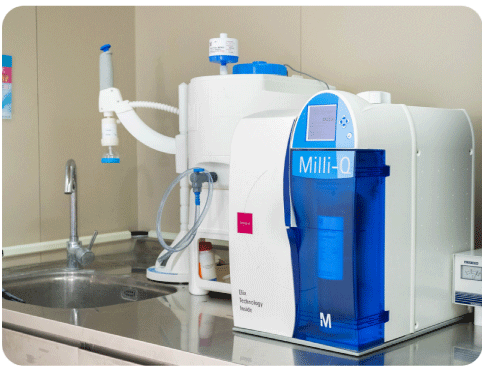 Quality Testing of Culture Medium |
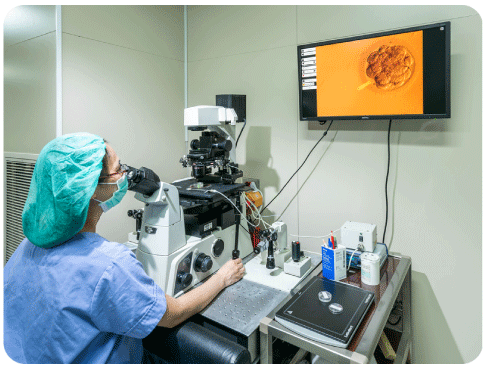 Laser-Assisted Incubation |
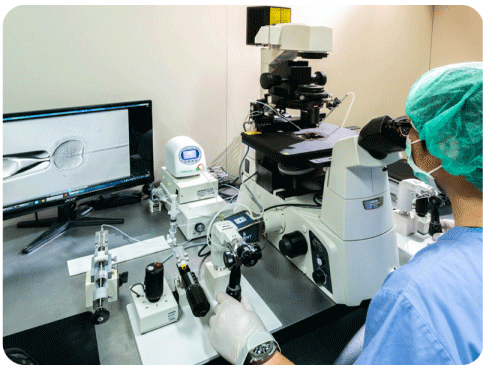 Sperm Injection and Spindle View |
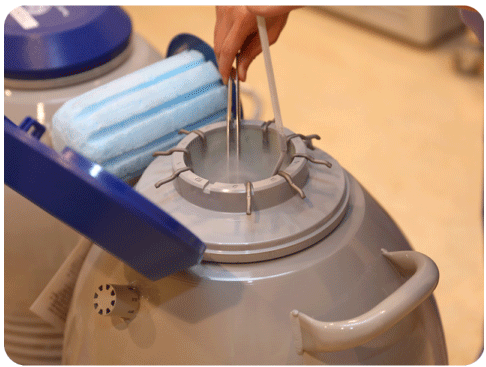 Oocyte / Sperm / Embryo Bank |
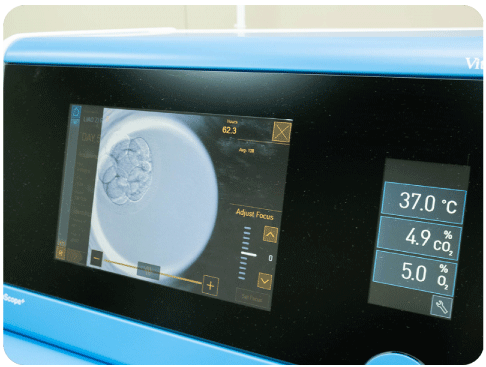 Time-Lapse Embryo Monitoring Culture System |
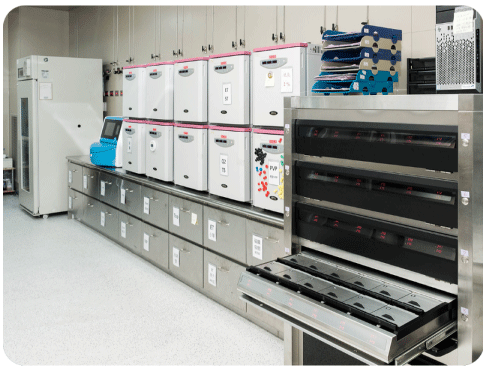 Dry and Traditional Incubators |
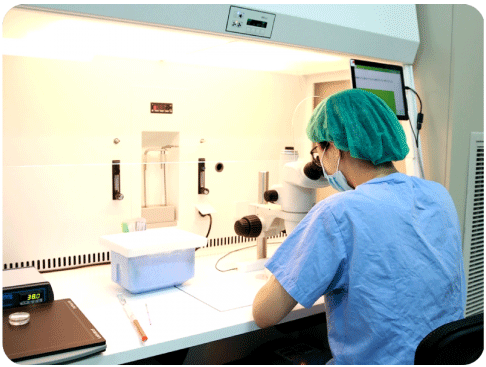 Sterile Operating Equipment |
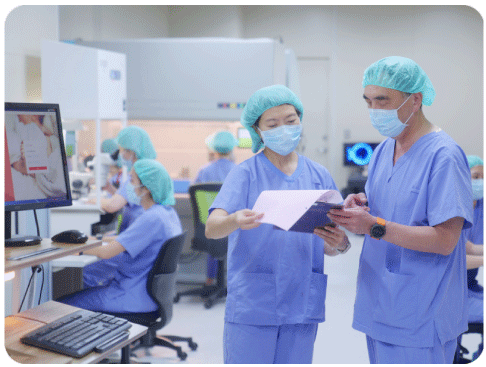 Embryology Laboratory |

